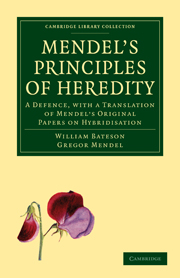 Mendel's Principles of Heredity
Mendel's Principles of Heredity A DEFENCE OF MENDEL'S PRINCIPLES OF HEREDITY
Published online by Cambridge University Press: 07 September 2010
Summary
“The most fertile men of science have made blunders, and their consciousness of such slips has been retribution enough; it is only their more sterile critics who delight to dwell too often and too long on such mistakes.”
Biometrika, 1901INTRODUCTORY
On the rediscovery and confirmation of Mendel's Law by de Vries, Correns, and Tschermak two years ago, it became clear to many naturalists, as it certainly is to me, that we had found a principle which is destined to play a part in the Study of Evolution comparable only with the achievement of Darwin—that after the weary halt of forty years we have at last begun to march.
If we look back on the post-Darwinian period we recognize one notable effort to advance. This effort—fruitful as it proved, memorable as it must ever be—was that made by Galton when he enuntiated his Law of Ancestral Heredity, subsequently modified and restated by Karl Pearson. Formulated after long and laborious inquiry, this principle beyond question gives us an expression including and denoting many phenomena in which previously no regularity had been detected. But to practical naturalists it was evident from the first that there are great groups of facts which could not on any interpretation be brought within the scope of Galton's Law, and that by no emendation could that Law be extended to reach them.
- Type
- Chapter
- Information
- Mendel's Principles of HeredityA Defence, with a Translation of Mendel's Original Papers on Hybridisation, pp. 104 - 208Publisher: Cambridge University PressPrint publication year: 2009First published in: 1902


